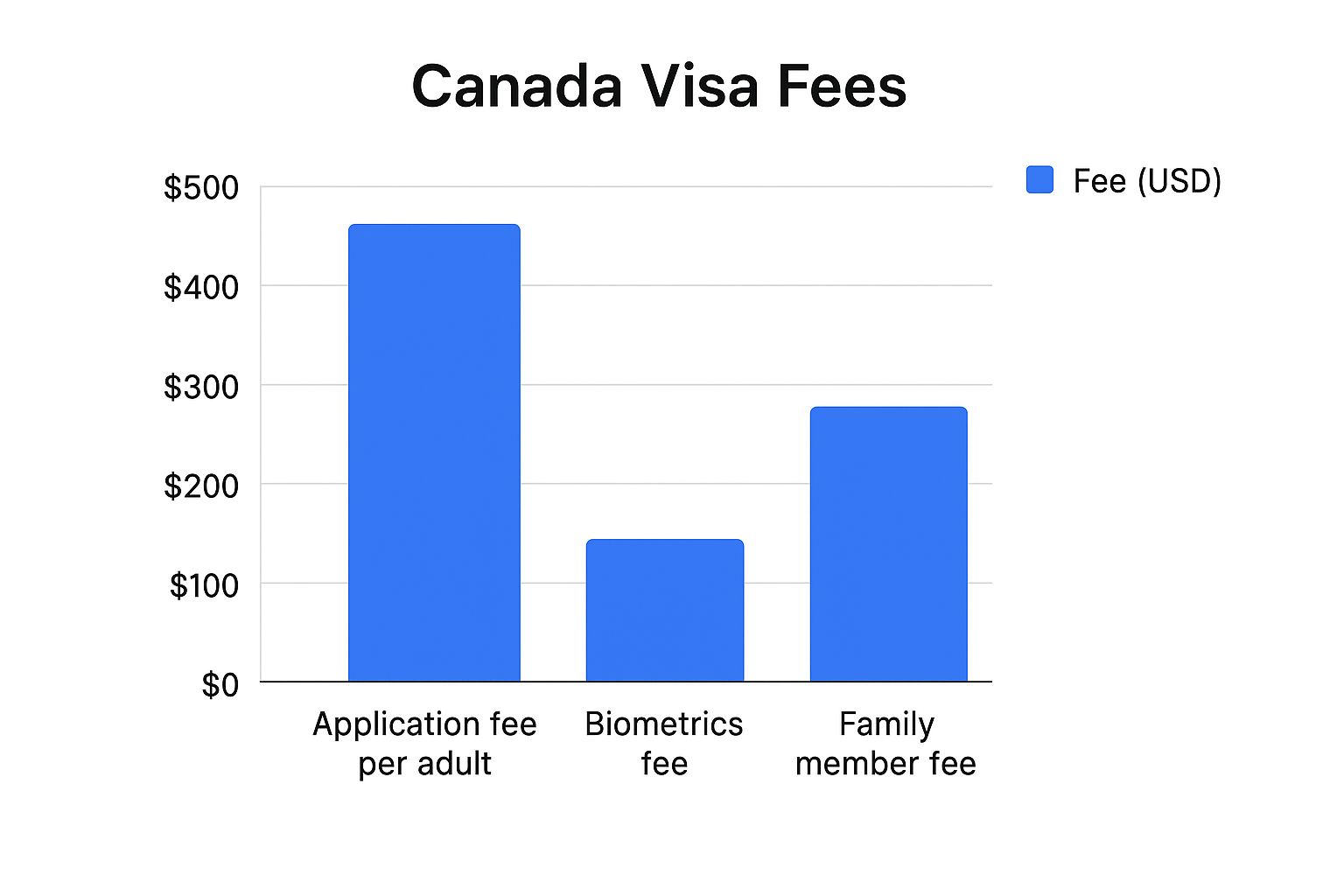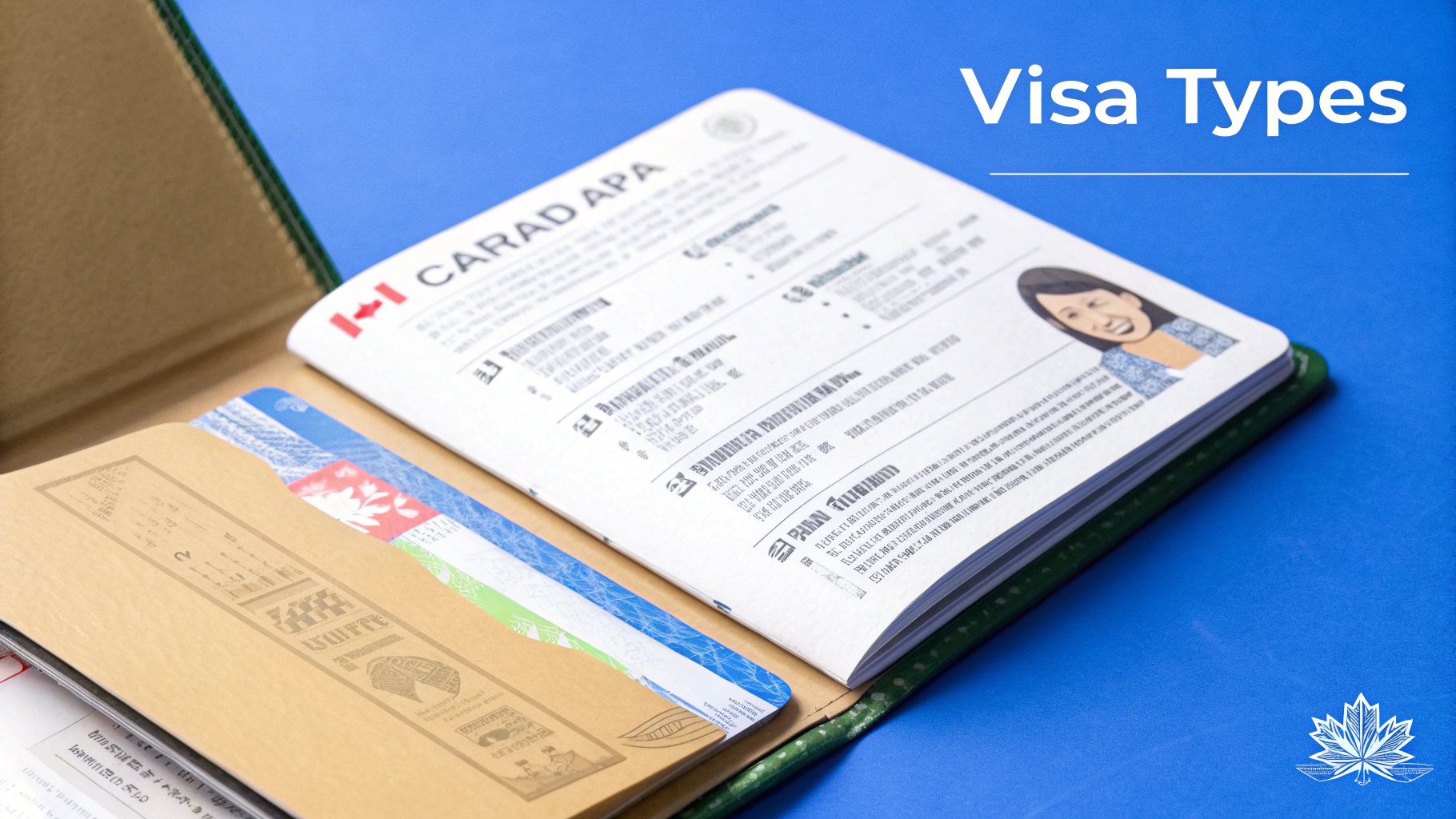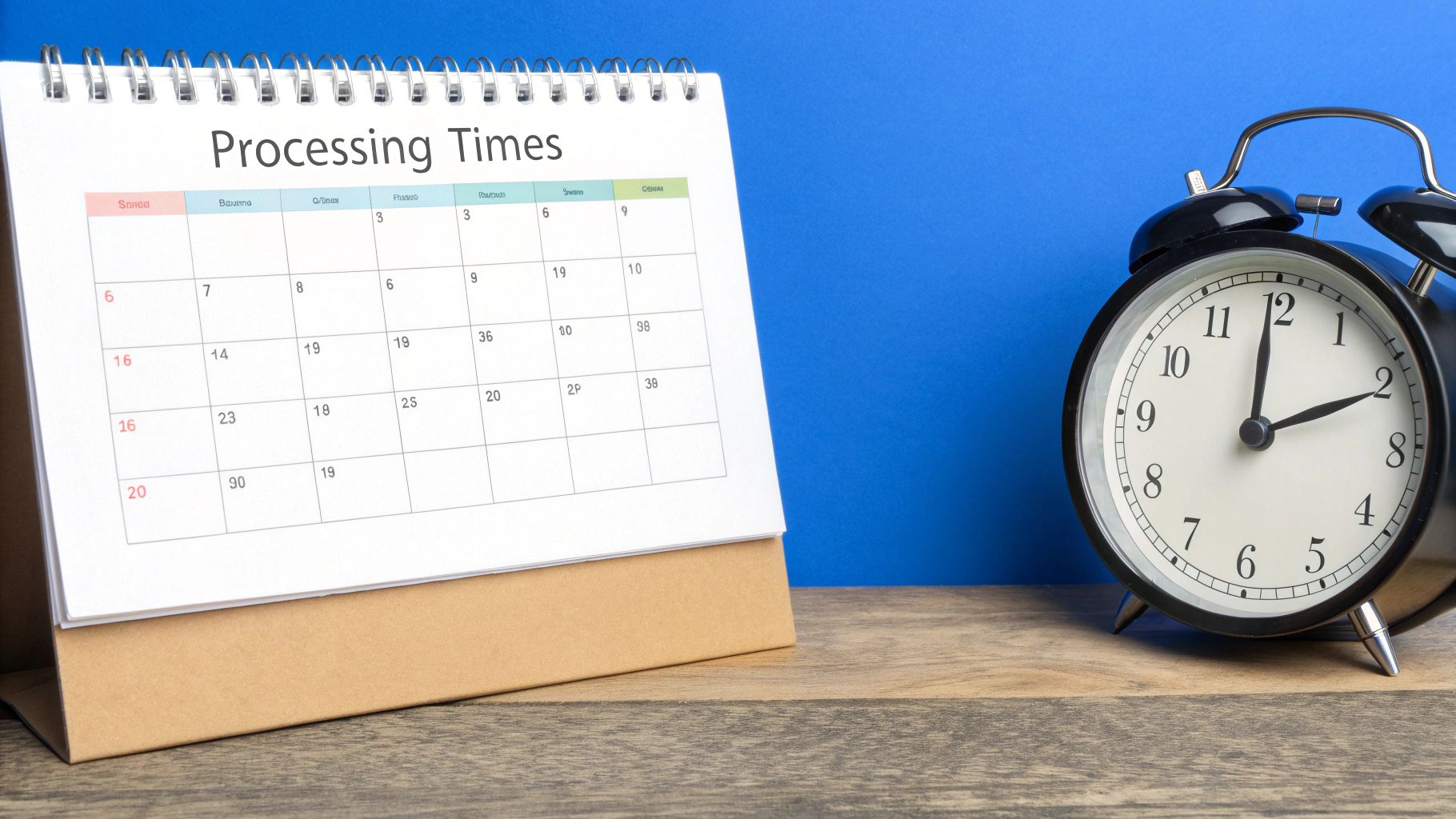How Much Is Visa for Canada from Nigeria? Find Out Now!

So, you're wondering how much a Canadian visa costs from Nigeria? Let's get straight to it. For a single person, the baseline cost is typically CAD $185. This amount breaks down into a CAD $100 application fee and a CAD $85 biometrics fee.
Think of that CAD $185 as your starting line, your "gate fee". The final figure you'll pay can change depending on the specific visa you need and any extra services you might use, like having your passport couriered back to you in Ibadan instead of picking it up in Lagos.
Understanding the Essential Canadian Visa Fees
When you're putting together a budget for your Canadian visa, it's easiest to split the costs into two piles: the mandatory government fees and all the other potential charges. The government fees are the non-negotiable part of the process, forming the core of what you'll spend. These are the fees that must be paid for your application to even be considered.
These are the fees that nearly everyone applying for a temporary visa—like for visiting, studying, or working—has to pay directly to the Canadian government. The application processing fee covers the administrative work of handling your case, while the biometrics fee is for taking your fingerprints and photograph at a Visa Application Centre (VAC) in Lagos or Abuja.
This chart gives you a quick visual breakdown of these primary costs.

As you can see, the application fee is the biggest piece of the puzzle, with the biometrics fee being the other essential component.
Key Fees to Expect
Based on the official 2024-2025 fee schedule from the Canadian government, a Nigerian applying for a standard visitor visa will pay the CAD $100 application fee plus the CAD $85 biometrics fee, bringing the total to CAD $185.
There's a bit of good news for larger families. If a family of five or more people from Nigeria applies at the same time, the government caps the total application fee at CAD $500, which can make things a lot more affordable, especially when planning a big family vacation.
To give you a clearer, at-a-glance view of the main costs, here’s a quick summary table.
Summary of Key Canadian Visa Fees for Nigerians
This table provides a quick overview of the main application and biometric fees for the most popular Canadian visa types for applicants from Nigeria.
| Visa Type | Application Fee (CAD) | Biometrics Fee (CAD) | Total Fee per Person (CAD) |
|---|---|---|---|
| Visitor Visa | $100 | $85 | $185 |
| Study Permit | $150 | $85 | $235 |
| Work Permit | $155 | $85 | $240 |
| Family (5+ people) | $500 (max) | $170 (max) | Varies |
This table covers the mandatory government charges, but remember, the visa application is just one piece of the puzzle.
It's crucial to look at the bigger picture and plan for the entire relocation journey. For a complete walkthrough of what to expect, take a look at our detailed guide on how to relocate to Canada from Nigeria. Getting a handle on the full process helps you budget properly for everything, not just the initial visa fees. We'll dive into those other potential costs in the next sections.
Breaking Down Canadian Visitor Visa Costs

For most Nigerians dreaming of a trip to Canada, the visitor visa is the first step. Whether you're planning a family holiday, seeing relatives in Toronto, or scoping out business ventures in Calgary, getting a handle on the costs upfront is crucial for a stress-free application. So, let’s get into the specifics of what you'll need to pay.
The starting point for any application is the government processing fee. For a single visitor visa, this is CAD $100. You can think of this as the fee for IRCC to simply open your file and begin their review.
Don't Forget the Mandatory Biometrics Fee
On top of that CAD $100, nearly every applicant has to pay for biometrics. This fee is CAD $85 per person and covers the cost of having your fingerprints and official photograph taken.
This isn't optional. If you're between the ages of 14 and 79, you must complete this step at a designated Visa Application Centre (VAC) in Nigeria, like the ones in Lagos or Abuja. It's a non-negotiable part of Canada’s security screening for all Nigerian applicants.
A common slip-up I see is people thinking the online application fee is the only government charge. The biometrics fee is separate but just as vital. If you don't pay it and get your biometrics done, your application will come to a dead halt. No two ways about it.
There is a bit of relief for families, though. If a family of five or more applies for visitor visas together, their total application fee is capped at CAD $500. The same goes for biometrics, with a family cap of CAD $170. This can make a big difference for larger families.
The Other Costs You Need to Plan For
The official government fees are only part of the story. To get a realistic idea of how much a visa for Canada truly costs from Nigeria, you have to account for the other charges that often catch people by surprise.
- VAC Service Charges: The VACs in Lagos and Abuja don't operate for free. You'll have to pay their service fees for handling your passport and paperwork.
- Courier Fees: If you can't pick up your passport in person (maybe you live in Port Harcourt), you'll need to pay extra for a courier service to deliver it back to you.
- Medical Exams: For some applicants, a medical examination by an IRCC-approved doctor is required. This is an additional expense that you'll have to cover yourself, and it can run into thousands of Naira.
Adding these potential costs to your budget from the get-go gives you a much clearer financial picture. It helps you avoid any last-minute financial scrambling and makes the entire process feel a lot more manageable.
Calculating Fees for Study and Work Permits
For Nigerian students and professionals, a study or work permit is the key to unlocking a new chapter in Canada. But getting that key involves more than just the initial application fees. To plan properly, you need to see the full financial picture.
Let's start with the basics for students. A study permit application has a fee of CAD $150, and on top of that, there's the standard CAD $85 for biometrics. But honestly, that’s just the tip of the iceberg. The real financial heavyweight for students is what’s known as Proof of Funds.
Understanding Proof of Funds for Students
Think of the Proof of Funds as your financial safety net. The Canadian government needs assurance that you can support yourself without struggling financially while you study. This isn't just a suggestion; it's a non-negotiable requirement to show you have enough money for your first year of tuition plus your living expenses.
For instance, if you're a student from Nigeria heading to a programme at the University of Toronto, you'd need to show you can cover your tuition. You'd also need to prove you have at least CAD $20,635 set aside just for living costs (if you're studying outside Quebec). For many Nigerian students, showing this lump sum in their bank account is the single biggest financial hurdle to overcome.
Work Permit Costs for Professionals
Now, for professionals eyeing a career in Canada, the costs hinge on the specific type of work permit you're after. The standard application fee is CAD $155, plus the familiar CAD $85 biometrics fee. This is the typical cost for employer-specific permits, where you already have a job offer lined up.
The real game-changer can be the Open Work Permit Holder fee, which costs an additional CAD $100. This permit allows you to work for almost any employer in Canada, offering far more flexibility than a closed permit.
Picture a tech graduate from the University of Ibadan who's landed a job in Vancouver. They'd be looking at a total of CAD $240 (the CAD $155 application fee + CAD $85 for biometrics). But if they qualify for an open work permit, that extra CAD $100 is a small price for the freedom to switch jobs without hassle.
To budget accurately and choose the best route for your career, it's worth diving deeper into the different permit types. You can learn more about the Canada work visa permit requirements to get a clearer understanding.
The Financial Path to Permanent Residence

For many Nigerians, the dream of moving to Canada isn't just about a temporary visit; it's about putting down roots and building a new life. This makes the journey to permanent residence (PR) a major milestone, and as you'd expect, the financial side of things is a bit more involved than a simple visitor visa application.
The main path for skilled workers from Nigeria is the Express Entry system. It's best to think of the costs here in layers, not as a single fee. You'll have the main government processing charges, of course, but there are also crucial expenses you need to cover before you can even submit your profile.
Breaking Down the PR Application Fees
The government fees for a PR application are higher because they reflect the serious nature of what you're applying for: the right to live and work in Canada for good. The single biggest chunk of this is the Right of Permanent Residence Fee (RPRF). Think of it as the final settlement payment you make once your application gets the green light, officially sealing your new status as a Canadian permanent resident.
For a skilled worker coming from Nigeria through an Economic Class program, the total fee for the main applicant is CAD $950. This is broken down into two parts: CAD $375 for the processing itself and CAD $575 for the RPRF. If you're bringing your spouse or partner along, that's an additional fee, and each dependent child will also add to the final tally.
It's so important to budget for the entire family right from the very beginning. A common oversight is forgetting to calculate the full cost for a spouse and children, which can unfortunately cause delays in your application process.
And don't forget those initial investments. Before you even get an Invitation to Apply, you need to have paid for your language tests (like IELTS, which costs over N100,000) and had your educational credentials assessed (ECA). These are non-negotiable first steps in the detailed application for PR in Canada and are essential for creating a realistic budget for the entire journey ahead.
How to Pay Your Canadian Visa Fees from Nigeria
So, you've filled out your application, and now it's time to pay. This part can feel a bit daunting, but it's simpler than it looks. The main way to pay is online, right on the official Immigration, Refugees and Citizenship Canada (IRCC) website as you're submitting everything.
This secure portal is set up to take major international credit and debit cards. For most of us in Nigeria, that means pulling out a Visa or Mastercard that's been cleared for international payments. You'll just need to punch in your card details at the final step of the online application process.
What to Do When Your Card Doesn't Work
It’s a classic problem: you try to pay, and the transaction is declined. Many Nigerian applicants hit this wall, often due to bank limits or card restrictions. Don't panic; it's a common issue with solid workarounds.
-
Your Domiciliary Account is Your Best Bet: The smoothest path is often a debit card linked to your domiciliary account (USD, EUR, or GBP). Since the visa fees are in Canadian Dollars (CAD), these cards are built for foreign currency payments and usually go through without a hitch.
-
Give a Virtual Dollar Card a Try: Several Nigerian fintech companies offer virtual dollar cards. You can easily fund them with Naira, and they are created specifically for international online shopping and payments. They can be a real lifesaver if your primary bank card isn't cooperating.
If there's one piece of advice to take away, it's this: never use an unofficial agent who offers to pay your visa fees for you. It's a well-known scam tactic. To keep your money and personal details safe, stick to paying yourself on the official IRCC website or in person at a Visa Application Centre (VAC).
If you're applying with a paper application or just aren't comfortable paying online, you have another option. You can head down to a VAC in either Lagos or Abuja and pay your fees in person. They have point-of-sale (POS) terminals available, giving you a secure, face-to-face alternative and clarity on exactly how much a visa for Canada will cost you on the day.
What Happens When Fees Change? (And Other Costs to Watch Out For)
One thing you should know about Canadian visa fees is that they are not set in stone. They can, and often do, change with very little warning. That's why your final step before paying anything should be a quick visit to the official Immigration, Refugees and Citizenship Canada (IRCC) website.
Think about it: you budget your entire application based on information you saw a few months ago, only to underpay by a few dollars. It sounds like a small mistake, but it's enough for IRCC to send your whole application back, setting you back weeks or even months. Always, always double-check the current fees. It’s a simple step that saves a world of trouble.
The Unexpected Cost of an Expired Permit
Life happens, and sometimes things fall through the cracks. Let's say you're a Nigerian student in Canada, and you realise your study permit has expired. You can't just apply for a new one from inside the country. You first have to apply for restoration of status, and yes, that comes with its own price tag.
This is one of those less common costs, but it’s a critical one to know about. It's essentially the fee for fixing the mistake and getting back into good standing. For instance, in late 2024, Canada bumped up several of its immigration fees. The cost to restore your status as a student, visitor, or worker went from around CAD $229 to about CAD $239.75. You can read up on these updates on the official IRCC fee changes page.
Here's a hard truth about this process: your visa processing fees are almost always non-refundable. If your application is refused, you don’t get that money back. "Story for the gods," as they say.
This is why meticulous planning is so important. The money you pay is for the time and effort an officer spends reviewing your file, not for the visa itself. It’s a financial risk, which makes it all the more crucial to submit a complete, convincing, and error-free application from the very beginning.
Common Questions About Canadian Visa Fees
Let's be honest, figuring out the costs for a Canadian visa can be confusing. To help you budget properly and avoid surprises, here are some straight answers to the questions we hear most often from applicants in Nigeria.
Are Canadian Visa Fees Refundable?
This is a big one, and the short answer is no. The application processing fees you pay are for the service of having an immigration officer review your case. Think of it like paying for a service, not a product.
Whether your visa is approved or refused, that fee is considered spent. The only major exception is the Right of Permanent Residence Fee (RPRF), which you might get back if your permanent residency application doesn't go through.
Can I Pay in Naira?
Unfortunately, you can't. All official fees for Canadian visas must be paid in Canadian Dollars (CAD).
From Nigeria, your best bet is to use a card that's set up for international payments. A debit card linked to a domiciliary account or a virtual dollar card usually works best, as they are designed to handle these kinds of foreign currency transactions without a hitch.
Is the Biometrics Fee Really Mandatory?
Yes, it almost certainly is. For nearly all Nigerian applicants between the ages of 14 and 79, giving biometrics (your fingerprints and a photo) is a required step.
This fee covers the cost of that collection process and is a standard part of Canada's security screening. Even if you’ve given biometrics for a previous application, you'll likely have to do it again for a new one. It's simply a non-negotiable part of the process.
Planning your move to Canada can feel overwhelming, but you don't have to do it alone. For instant, accurate answers to all your immigration questions, trust JapaChat. Sign up for free today and get the clarity you need for your journey at https://japachat.com.

Leave a Reply